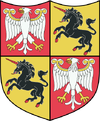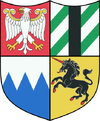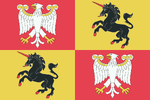m (→Monarchs: clean up) |
|||
| Line 25: | Line 25: | ||
Only a handful of generations ago Kovir and Poviss were officially still part of [[Redania]]. King [[Radovid I]], known as Radovid the Great, handed dominion and title of Koviri earl over them to his hated brother, [[Troyden]], with one stipulation – that he never leave his newly acquired demesne and not interfere in matters of state. |
Only a handful of generations ago Kovir and Poviss were officially still part of [[Redania]]. King [[Radovid I]], known as Radovid the Great, handed dominion and title of Koviri earl over them to his hated brother, [[Troyden]], with one stipulation – that he never leave his newly acquired demesne and not interfere in matters of state. |
||
| − | Handing over this rocky scrap of far-northern ground (where, the saying went, the year had two seasons – August and winter) was naturally meant as a cruel joke, a slap in the face for the |
+ | Handing over this rocky scrap of far-northern ground (where, the saying went, the year had two seasons – August and winter) was naturally meant as a cruel joke, a slap in the face for the overly ambitious Troyden. |
Yet time soon proved that Radovid the Great had made a grave error. Before long it was discovered that Kovir's bare rocks hid priceless treasure in the form of enormous deposits of precious metals and rock salt. This discovery, in turn, led to tremendous growth in productive industry. Mills, forges, and workshops sprouted up like mushrooms after a hearty rain. |
Yet time soon proved that Radovid the Great had made a grave error. Before long it was discovered that Kovir's bare rocks hid priceless treasure in the form of enormous deposits of precious metals and rock salt. This discovery, in turn, led to tremendous growth in productive industry. Mills, forges, and workshops sprouted up like mushrooms after a hearty rain. |
||
Revision as of 06:10, 8 December 2019
The Kingdom of Kovir and Poviss (also known shortly as Kovir and Poviss or simply Kovir) is one of the Northern Kingdoms located on the Gulf of Praxeda. It is also the largest exporter of mineral resources in the known world, with huge profits from trade. It is ruled by king Tankred Thyssen of the House of Thyssen and maintained neutrality during the Second Nilfgaard War, refraining from lending coin nor men to either side.
Because it is so mountainous, the region is rich in mines. Kovir and Poviss export glass, salt, iron ore, silver, nickel, lead, tin, zinc, copper, chromium, titanium, tungsten, and platinum. Not to mention three-quarters of the world's ferroaurum, kryobelitium, and dimeritium and 80% of the world's gold.[1]
History
Kovir and Poviss are without a doubt the richest realms in the North. Even though that was not like this always, poverty of locals was once literally on everyone's lips, in the form of antiquated common sayings. As recently as the days of Heribert the Quarrelsome, one spoke of a particularly impoverished person as being "poorer than a mouse from Poviss," called bone broth "Koviri delight" and referred to beggars as "praxedes," after the gulf along the shores of which these kingdoms lie.
Only a handful of generations ago Kovir and Poviss were officially still part of Redania. King Radovid I, known as Radovid the Great, handed dominion and title of Koviri earl over them to his hated brother, Troyden, with one stipulation – that he never leave his newly acquired demesne and not interfere in matters of state.
Handing over this rocky scrap of far-northern ground (where, the saying went, the year had two seasons – August and winter) was naturally meant as a cruel joke, a slap in the face for the overly ambitious Troyden.
Yet time soon proved that Radovid the Great had made a grave error. Before long it was discovered that Kovir's bare rocks hid priceless treasure in the form of enormous deposits of precious metals and rock salt. This discovery, in turn, led to tremendous growth in productive industry. Mills, forges, and workshops sprouted up like mushrooms after a hearty rain.
Radovid III decided to correct his famous forebear's mistake and take back the northern frontiers of his kingdom. He was convinced the combined armies of Redania and its then-ally Kaedwen ruled by Benda would quickly bring this ever more audacious vassal led by Gedovius in line. History took a different turn, however, and Kovir won a resounding, crushing victory. Radovid III was forced to sign the pact named First Treaty of Lan Exeter, granting Kovir independence while binding it to eternal neutrality – a promise Troyden's successors have kept with great diligence.
Until late years of 13th century Kovir was ruled by Esterad Thyssen, a king as wise as he was greedy. Yet his untimely demise did not stop his lands from continuing to develop and blossom due to his extreme free market policy. Koviri metallurgists proudly compete with the best Mahakam can offer, and many believe the University of Lan Exeter long ago surpassed the famous Oxenfurt Academy as the leading seat of higher learning in the North. And so it has come to pass that, over the course of a few generations, the Koviries and Povissites have turned from paupers into princes, from beggars into bankers.[1][6][7]
National Emblems
The first known coat of arms and flag of the Kingdom of Kovir and Poviss, used at the time when the realm was officially recognized by Redania and Kaedwen, consisted among others of Redanian Eagle and Kaedwenian Unicorn, as the royal couple were descended from ruling dynasties of both these kingdoms.[1][N 1] After the throne was inherited by House of Thyssen, the Redanian and Kaedwenian symbols were removed, and the currently used arms have been created during the reign of King Baldwin Thyssen.[8]
Originally, the flag of the Kingdom was in reds and yellows, and consisted of Redanian Eagles and Kaedwenian Unicorns.[1] The color scheme was apparently preserved after the change of the dynasty, but the heraldic animals were replaced with House of Thyssen coat of arms, the armed arm.[9]
Recent arms: Quarterly, I Gules an armed arm Argent (House of Thyssen); II Argent bendlets sinister Vert a pale Sable (Principality of Poviss); III per fess intended Argent and Azure (Duchy of Narok); IV Gules demi-eagle Argent (Margraviate of Talgar).
Emblems in the infobox and below have been created by Wiki editors basing on official description and/or depictions.
Notable people
Monarchs
Notable locations
Territories, vassal states, and provinces
Settlements
Notes
- Kovir and Poviss are portrayed rather inaccurately in regards to borders in the map made for The Witcher 2: Assassins of Kings. Strangely, the two are portrayed as separate entities, with Talgar and Velhad portrayed as kingdoms in their own right as well.
Footnotes
- ↑ Note that the inclusion of Duchy of Narok into Kovir and Poviss first known coat of arms, as depicted here, is speculative. The "fan tradition" of including it in the coat of arms during House of Troyden period dates back to work of Adam Kromer, who made the coat of arms used in Andrzej Sapkowski's original website.




